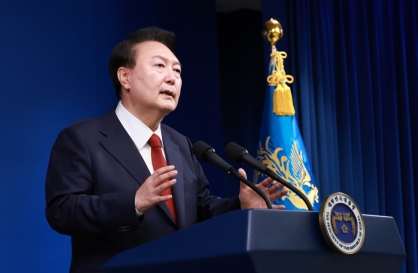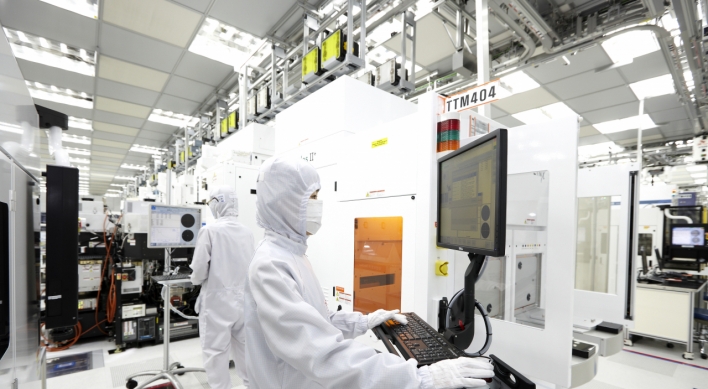Samsung Electronics hinted at the advent of the open-source operating system “Tizen” under co-development with Intel by saying it would apply it to a wide array of products including televisions and smartphones.
In a recent interview with Die Welt, a German publication during the IFA 2013 trade show in Berlin, Yoon Boo-keun, Samsung’s chief of consumer electronics business said, “Tizen is going to be used on some of our smartphones, along with our TVs and on home appliances.” He added that this way, the electronics maker would be able to create an ecosystem where all of Samsung’s devices can become interconnected.

An official from the Seoul-based electronics firm confirmed that the company was currently working on TVs and other devices running on Tizen.
“But the timing of commercialization depends on market conditions,” he said.
Tizen is one of Samsung’s key efforts to wean itself off Google and its Android operating system.
Rumors of Samsung releasing a smartphone running on Tizen as early as the third quarter of this year have been circulating since January. The Tizen phone is expected to have a screen size of 4.8 inches and use a 4G LTE-enabled Qualcomm chip.
Other Samsung executives also have talked of Tizen-friendly devices.
Last month, Shin Jong-kyun, head of Samsung Electronics’ mobile business, told CNET, a U.S. tech news outlet, that he wanted every Samsung product to run on the Tizen operating system.
Kim Hyun-seok, head of Samsung’s visual display business told Korean media in April that Tizen could be installed on a smart TV.
Samsung and Intel has been leading the development of the Tizen platform since 2011.
Meanwhile, industry watchers continue to cast doubt on the success of the smart TV running on the Tizen OS.
“It is not about an operating system that is compatible with smartphones, but about convenience,” said an official who declined to be named.
Given that TVs are more of a “lean-back” device compared to the “lean-forward” phones and tablets, he said introducing a new operating system would not necessarily lead to growth in smart TVs unless the viewing experience becomes more convenient.
By Kim Young-won (wone0102@heraldcorp.com)
In a recent interview with Die Welt, a German publication during the IFA 2013 trade show in Berlin, Yoon Boo-keun, Samsung’s chief of consumer electronics business said, “Tizen is going to be used on some of our smartphones, along with our TVs and on home appliances.” He added that this way, the electronics maker would be able to create an ecosystem where all of Samsung’s devices can become interconnected.

An official from the Seoul-based electronics firm confirmed that the company was currently working on TVs and other devices running on Tizen.
“But the timing of commercialization depends on market conditions,” he said.
Tizen is one of Samsung’s key efforts to wean itself off Google and its Android operating system.
Rumors of Samsung releasing a smartphone running on Tizen as early as the third quarter of this year have been circulating since January. The Tizen phone is expected to have a screen size of 4.8 inches and use a 4G LTE-enabled Qualcomm chip.
Other Samsung executives also have talked of Tizen-friendly devices.
Last month, Shin Jong-kyun, head of Samsung Electronics’ mobile business, told CNET, a U.S. tech news outlet, that he wanted every Samsung product to run on the Tizen operating system.
Kim Hyun-seok, head of Samsung’s visual display business told Korean media in April that Tizen could be installed on a smart TV.
Samsung and Intel has been leading the development of the Tizen platform since 2011.
Meanwhile, industry watchers continue to cast doubt on the success of the smart TV running on the Tizen OS.
“It is not about an operating system that is compatible with smartphones, but about convenience,” said an official who declined to be named.
Given that TVs are more of a “lean-back” device compared to the “lean-forward” phones and tablets, he said introducing a new operating system would not necessarily lead to growth in smart TVs unless the viewing experience becomes more convenient.
By Kim Young-won (wone0102@heraldcorp.com)
-
Articles by Korea Herald










![[K-pop’s dilemma] Time, profit pressures work against originality](http://res.heraldm.com/phpwas/restmb_idxmake.php?idx=644&simg=/content/image/2024/05/08/20240508050705_0.jpg&u=20240508171126)








![[Today’s K-pop] Stray Kids to drop new album in July: report](http://res.heraldm.com/phpwas/restmb_idxmake.php?idx=642&simg=/content/image/2024/05/09/20240509050659_0.jpg&u=)